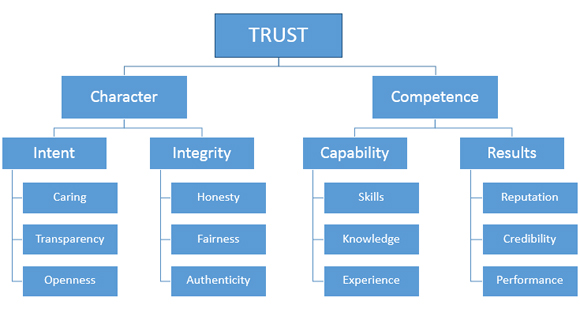 Having worked with and for the recruiting process of great new sales people for so many years, we’d like to give some basic thoughts on the question of what makes a good salesperson in terms of gaining trust, analysing the aspects that concur to build up this not-so-arcane process.
Having worked with and for the recruiting process of great new sales people for so many years, we’d like to give some basic thoughts on the question of what makes a good salesperson in terms of gaining trust, analysing the aspects that concur to build up this not-so-arcane process.
A salesperson who is loved and trusted by his clients is unanimously considered as good and everyone is fascinated by the idea of trust, but it seems a bit difficult to put your finger on where unique trust comes from, or how you even build it. People often think it just happens. Instead, we can get some good explanation of the trust process by an interesting graphic called the Trust Matrix.
The Trust Matrix says that you need a unique combination of both character and competence to build trust. You can go online and read all the case studies in the world about a potential new supplier, but if something just doesn’t feel right, then it probably isn’t right. Character forms a huge part of what we do – it’s usually why customers stay with a company for the long term. But how do you define it? Or even more complicated, how do you replicate character?

But what is the character?
The Trust Matrix believes character is a mix of integrity and intent. This explains why being true to somebody’s roots and straightforward with customers is better for creating trust than an overly polished slick presentation and a sales script. When we first work with customers, delivering your face presentation, sharing everything about how the company came about, your approach and culture and what working with you is like, would mean a difference in gaining trust, too. Customers want to know that they are buying into something real, honest and reliable; that when they encounter an issue, someone is there to help. Sales have long left the building by the time your customer really needs you. Being there at the weekend, against all odds, is what makes the difference between character and a good sales patter.
The problem with many sales training programmes is that they focus on how to make cookie cutter sales reps – with everyone acting in the same way, saying the same things and delivering the same presentation. However, this often doesn’t just work as good as when each of your Sales Reps operates in a completely different way to the next. What suits some customers, doesn’t suit others because people are different individuals. Those differences in our personalities make us real and customers will get a good handle on who you are as a company pretty early on.
Combined with competence
Competence sits on the other side of the character in the Trust Matrix as the other key element, apparently made up of the capability to deliver results. This is the part where customers need to see proof that you can deliver the services they need to a great level, regardless of whether they get on with you or not. Organisations that focus too much on improving sales without looking at what happens once a customer is actively engaged with your business, tend to suffer from a high rate of customer churn. This is where the client has selected you to work with, but quickly realises that the skills aren’t there, or problems start to emerge – and they ultimately walk away from the contract.
Character alone won’t see you through serious competency issues. A high degree of results-based competence built on evidence of previous experience delivering the same services, alongside examples of where you have performed well for other organisations is the key.
Balancing the two
Even in the B2B world, it’s deeply true that every decision is in some way an emotional decision, based on a unique mix of character and competence, balancing that ‘je ne sais quoi’ with experience and skill. This is why you need to build such a strong, and long, partnerships with your customers. The customers should become friends and you should partner in different ways as your company changes and your clients’ own businesses morph and grow.
